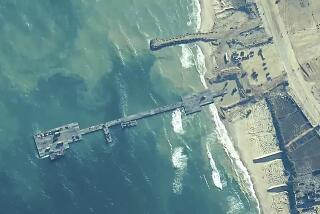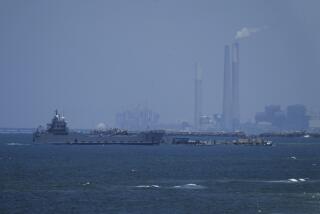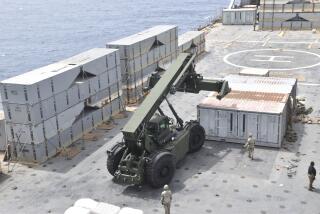First Wave of U.N. Forces Arrives in Iraq to Replace American Troops : Gulf: Some fear the U.S. departure from the buffer zone because Kuwaitis are reluctant to protect refugees sheltered there.
- Share via
SAFWAN, Iraq — The first contingent of a U.N. observer force arrived Wednesday to begin replacing U.S. forces in southern Iraq, but Kuwait’s reluctance to provide haven for fleeing Iraqis has stalled efforts to protect an estimated 20,000 refugees on the Iraqi-Kuwaiti border.
The Kuwaiti government’s refusal to open a refugee camp outside the demilitarized zone on the border has prompted authorities to begin looking for another site--perhaps in Saudi Arabia--to protect Iraqis fleeing the regime of President Saddam Hussein, officials said.
International aid workers have expressed frustration that Kuwait, citing security concerns, has failed to comply with what they said are provisions of international law requiring nations to provide protection for refugees who have fled danger or persecution in Iraq.
“If people who are afraid for their lives are on Iraqi soil, they need to get off Iraqi soil,” said one official who is working on the issue. “Security concerns have never been sufficient reason to deny asylum.”
Kuwait, through its Red Crescent Society, is already operating a camp for about 9,000 refugees at a site just on the border. It has resisted efforts to move the camp to a safer location farther south, outside the nine-mile-wide demilitarized zone, because of fears that the country’s still-recovering security system cannot cope with an influx of thousands of Iraqis, some of them potential terrorists or members of the Iraqi secret police.
“We can’t afford another problem. We have enough,” former Planning Minister Suleiman Mutawa said last week. Other Kuwaitis have questioned how Kuwait can be expected to provide refuge for Iraqis just two months after a devastating, seven-month-long occupation by Iraq. Many Kuwaitis have rejected the idea of providing even food and water to refugees living in the border camp.
The issue is becoming critical with the arrival of U.N. observer forces who, when they complete their deployment in the next two weeks, will trigger the withdrawal of all remaining U.S. forces from the demilitarized zone. Many Iraqi refugees who participated in uprisings against Hussein’s regime in southern Iraq are terrified that Iraqi police will move into the camps when the U.S. forces depart and arrest all those who have cooperated with the Americans.
The issue is particularly critical for an estimated 11,000 refugees living in and around a U.S. Army-run camp on the Iraqi side of the demilitarized zone. U.N. officials have said Iraqi armed police will have authority to patrol the Iraqi section of the zone, under certain as-yet-undetermined conditions, once the U.S. forces withdraw.
“Kuwait suffered for Saddam Hussein for seven months. Why are the people crying about this? We suffered 23 years,” said a mathematics professor from the Iraqi city of Babylon who asked not to be identified. “We are sure, 100%, that if the American forces pull out, we will all be killed. No doubt in my mind.”
While Kuwait initially tried to limit the camp it operates to refugees from third countries such as Egypt and Syria, hundreds of refugees from the U.S. camp have been streaming south in the past several days, and Iraqi residence at the southern camp is now a fait accompli.
Col. Bill Nash, commander of the 3rd Armored Division’s 1st Brigade, said before handing over control of a U.S. communications position north of Safwan to the U.N. observers Wednesday that American forces are determined to protect the refugees until some permanent solution is found.
However, the commander of the 1,440-member, 36-nation U.N. Iraq-Kuwait Observer Mission (UNIKOM), Austrian Maj. Gen. Gunther Greindl, said all U.S. and Iraqi forces will have to withdraw from the demilitarized zone once the U.N. deployment is complete.
There are about 4,000 U.S. forces in the buffer zone, and there is an unknown number of Iraqi troops deployed near the port of Umm al Qasr, which will serve as headquarters for the UNIKOM group.
“We will proceed gradually. Each time we move into a place, we will ask the troops to withdraw before we arrive,” said U.N. spokesman Majid Fayed.
Protection of the refugees is neither within the scope of the United Nations’ mission, which is strictly that of an observer force, nor its capability, since the 300 observers will be unarmed, and infantry troops assigned to UNIKOM will have instructions to use their weapons only to protect U.N. representatives, Greindl said.
The search for a haven for Iraqi refugees in the south has attracted far less world attention than the issue of the Kurdish refugees in the north and is mired in a number of perplexing legal issues that have made aiding the refugees difficult.
For instance, the Office of the U.N. High Commissioner for Refugees is powerless to begin helping the fleeing Iraqis until they officially cross into and are accepted by Kuwait.
But Kuwait’s refusal to officially grant asylum to the refugees has made that impossible. Complicating the issue is the fact that Kuwait’s long-disputed border with Iraq has made it impossible to determine for certain whether the Kuwaiti-operated camp on the border is truly in Kuwaiti territory.
Iraq’s agreement earlier this week to allow the U.N. refugee office to open four or more humanitarian offices in Iraq may open the way for the agency to provide some aid to refugees in the south, as well as the north, but the scope of that assistance is unknown.
In any case, U.N. workers would be powerless to prevent Iraqi reprisals against citizens suspected of cooperating in the uprisings in the south, one official said. “It would be primarily as a witness who potentially would be able to expose them but wouldn’t be able to do anything to stop it,” he said. “That’s why protection cannot be provided on Iraqi soil.”
Nasser Momen, director of the Kuwaiti-operated camp, said he and his staff are assuring refugees that they will be safe in the facility, even though it lies directly on the border within the demilitarized zone.
“We tell them you are now in Kuwait border and nobody can touch you here,” he said. Nonetheless, he said, camp officials hope to win approval from the government to move the camp at least five kilometers south “as soon as possible.”
“Kuwait should do more,” Momen said. “It’s doing its best, but maybe you have seen Kuwait city. The government is putting all its efforts into Kuwait city, for the schools, for the ministries, for the people there.”
Momen said that at a meeting with Kuwait’s crown prince and prime minister, Sheik Saad al Abdullah al Sabah, he warned him that Kuwait would be asked to accept a large share of the burden for new refugees flooding into the existing camp as U.S. forces withdraw. “I told the prime minister this camp will be nearly 20,000 or more. OK? He told me OK.”
U.S. troops over the past several weeks have served more than 700,000 meals to refugees in and around the northern, American-run camp. They have provided 1 million gallons of water, and U.S. physicians and medics have treated more than 18,000 patients.
The first UNIKOM deployment officially began at noon Wednesday, when Nash and his officers pulled down the U.S. flag at one of the last remaining American checkpoints in southern Iraq, Checkpoint 99, north of Safwan.
It is the location where U.S. forces have conducted official communications with Iraqi forces since the cease-fire took effect.
As about a dozen American Army officials pulled away in their utility vehicles, Greindl and the new U.N. commander for the observation post, Irish Lt. Col. Peter Feely, hoisted the U.N. flag.
More to Read
Sign up for Essential California
The most important California stories and recommendations in your inbox every morning.
You may occasionally receive promotional content from the Los Angeles Times.












